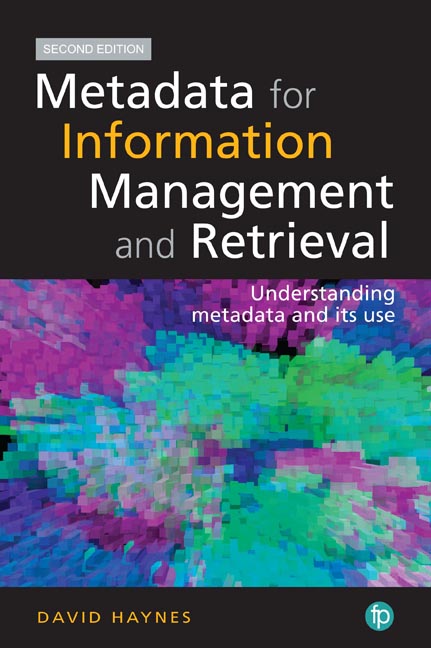4 - Metadata standards
from PART I - METADATA CONCEPTS
Published online by Cambridge University Press: 08 June 2018
Summary
Overview
This chapter looks at the structure of metadata standards. Understanding the way in which standards are created and how they are constructed gives us an insight into their use and potential applications to different situations. Metadata standards have arisen in different collections and user communities and some of the main metadata standards are described. This is not intended to be a comprehensive survey but rather an overview of the range of metadata standards on offer with pointers to further information about specialist standards. It starts with a description of Dublin Core, which is probably the most widely used standard, partly because of its simplicity and partly because it was designed for web resources. It illustrates some of the main features of metadata standards and is itself used as the basis for specialist standards and application profiles. The chapter goes on to consider some of the standards that are used in the library and information field for bibliographic materials and social media. It also describes metadata standards used for non-textual materials.
The nature of metadata standards
Metadata standards allow for exchange of data and by doing so ensure the future usability of information resources. By having a documented standard, it is possible for future users of the metadata to understand the conventions in place and the intentions behind the metadata. Declared standards are an important tool for controlling the quality of data about information resources. Agreed conventions for generating content and for analysing resources in order to describe them means that there is greater consistency. This allows for interoperability, so that metadata can be exchanged between applications and institutions. It also helps users by enabling them to confidently search metadata collections, knowing where metadata such as dates, creator names, and title information is held. Metadata can also be repurposed for use in new environments and contexts. The growth of linked data has been an example of extensive re-use of metadata collections. A model of the world and the relationship between resources and other entities are implied by metadata standards, which is why a prior understanding of data modelling (covered in Chapter 3) is essential.
- Type
- Chapter
- Information
- Metadata for Information Management and RetrievalUnderstanding metadata and its use, pp. 49 - 74Publisher: FacetPrint publication year: 2018



